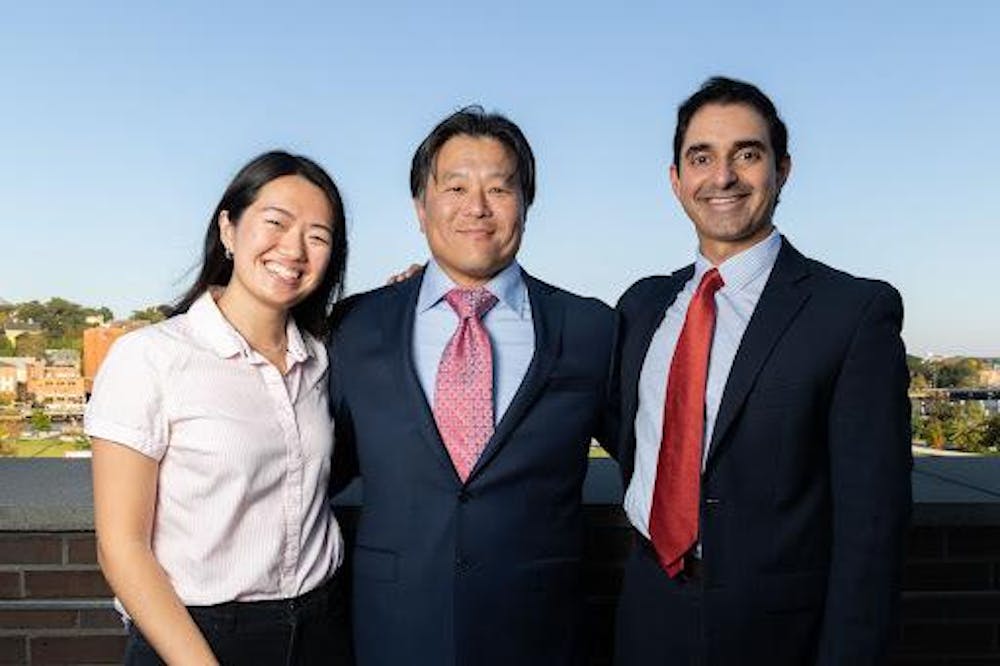KardioStatus, a new biotechnology software development company founded in 2022 at the Warren Alpert Medical School, uses AI technology to analyze patient biometrics and forecast individual medical outcomes.
The company was founded by Anthony Chu, a cardiac electrophysiologist and clinical assistant professor of medicine, and Anshul Parulkar ’10 MD’18, a cardiology fellow at Rhode Island Hospital. They are working with a team of Brown community members, including recently onboarded medical student Emily Wang ’22 MD ’26, to develop their technology and seek FDA approval for its clinical use.
“Current medical decision-making is, at best, reactionary,” said Chu. “Our vision is to use biometric-driven predictive analytics to facilitate proactive therapies. Imagine what we could achieve in medicine if we had a better understanding of the when in addition to the why. “
Prior methods of creating patient care plans have been largely reactive to existing health issues, a problem KardioStatus aims to solve, Wang said.
KardioStatus is currently working to address obstructive sleep apnea, a condition that causes episodes of interrupted breathing during sleep, Chu said. The group is using electrocardiogram data — biometrics used to analyze a patient’s heart rhythm and electric signaling — from OSA patients to investigate when individuals have an apneic episode.
Instead of reacting to apneic episodes after they happen, KardioStatus aims to predict them preemptively. Along with yielding information about a patient’s current health — such as sleep cycles or types of irregular heartbeats — the technology can “medically forecast,” Chu said.
Medical forecasting “gives physicians the ability to be proactive,” Chu said.
KardioStatus is working in collaboration with the CRUNCH group, led by Professor of Applied Mathematics and Engineering George Karniadakis. “We provide algorithms, they provide data collection and what the problem is,” Karniadakis said.
The AI algorithm from KardioStatus, created with the assistance of the CRUNCH group, is trained to understand the implications of the data from sleep apnea patients. “The idea is that you can get signals from apnea patients and then you train a neural network with something called supervised learning,” Karniadakis explained. “After you train the neural network, you’re hoping that it will predict new situations.”
KardioStatus’s goal is to eventually collect data through wearable technologies, such as a patch or a watch, predicting outcomes without invasive testing, Chu said.
The first experiments have been remarkably successful, according to Wang. “Based on the data that we have, (the algorithm) was highly predictive of the next sleep apnea event, which is super exciting because then we’re able to modify treatments and help patients have a more restful night.”
KardioStatus is operating in a new biotechnology space classified by the FDA as “Software as a Medical Device.”
“It’s unlike other types of software,” Chu explained. “It’s software that is tied to clinical outcomes and designed to function independently of medical grade hardware” — instruments like heart monitors.
KardioStatus also hopes to use this developing technology for broader clinical applications. “The idea is to create an algorithm that can take input data, whether it’s (electrocardiogram) data or eventually looking at blood serums to help predict the onset of diseases,” Wang said.
The team’s ultimate goal is to streamline the process of diagnosing a patient and working on a treatment plan. “Ideally it would be nice if you’re given a patient’s entire data set and you can tell them exactly what they may have already and any risk factors they have for other diseases,” Wang said.
KardioStatus plans to engage with data from a group of participants diverse in sex, race, nationality and age. According to Chu, a lot of AI data has been “flawed for decades” because it is drawn from populations that are “male-dominated, caucasian, American and of a certain age type.”
According to Chu, KardioStatis is currently operating on investments from the State of Rhode Island, a partnership with the University and funding from outside investors.

Francesca Grossberg is a staff writer covering Science and Research. She is a sophomore from New York City studying Health and Human Biology.





